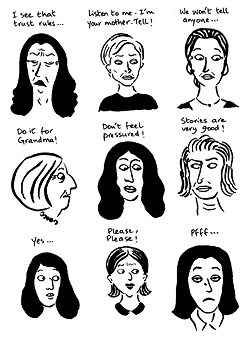There’s chick lit, there’s what TheVillage Voice recently dubbed Quit Lit (The Devil Wears Prada, The Nanny Diaries, the recent Everyone Worth Knowing), and now, just in time for the holidays, there’s Pic Lit, wherein female writers unravel their anxieties and experiences not just in words but in scrappy, messy hand-drawn pictures.
Having made a name for herself with Persepolis and Persepolis 2, Marjane Satrapi returns with Embroideries (Pantheon, $16.95). Satrapi’s earlier work first appeared in English in 2003, as the West was hungry for information about the Middle East—and more than happy to have that information softened with humor and drawings. She focused on the day-to-day aspects of childhood in Iran during the Islamic Revolution. She now turns to her young adult life in Embroideries, and her stark, stylized yet simple drawings work well with the odd, uncomfortable depictions of tea parties where proper ladies share very improper stories and of a grandmother who sips opium tea.
Because Satrapi’s stories are inherently interesting (at least to an American born and raised in a small, white-bread town), it’s easy to imagine that her prose would be interesting on its own. But she uses her illustrations to, for example, portray a series of facial expressions: shock, surprise, shame. In this way, she adds levity and even more depth to the text.
My Depression: A Picture Book (Hyperion, $16.95) by Elizabeth Swados has very little levity and too much depth. Moreover, it takes itself far too seriously—an especially problematic situation when you’re relying on cliché and your images are scribbles. Even if you can identify with Swados’ feelings, it’s hard to summon much interest in this book.
Carol Tyler’s Late Bloomer (Fantagraphics, $28.95) is somewhere in the middle. In the forward by R. Crumb, the famed illustrator says Tyler’s are the only comics that bring him to the verge of tears. Tyler uses traditional black-and-white cartoon cels as well as larger watercolor illustrations to color her tales of dysfunctional family drama and substitute-teacher horror stories. Plainly stated and sometimes uncomfortably dry, Tyler doesn’t go for sympathy or laughs, but gets both.








